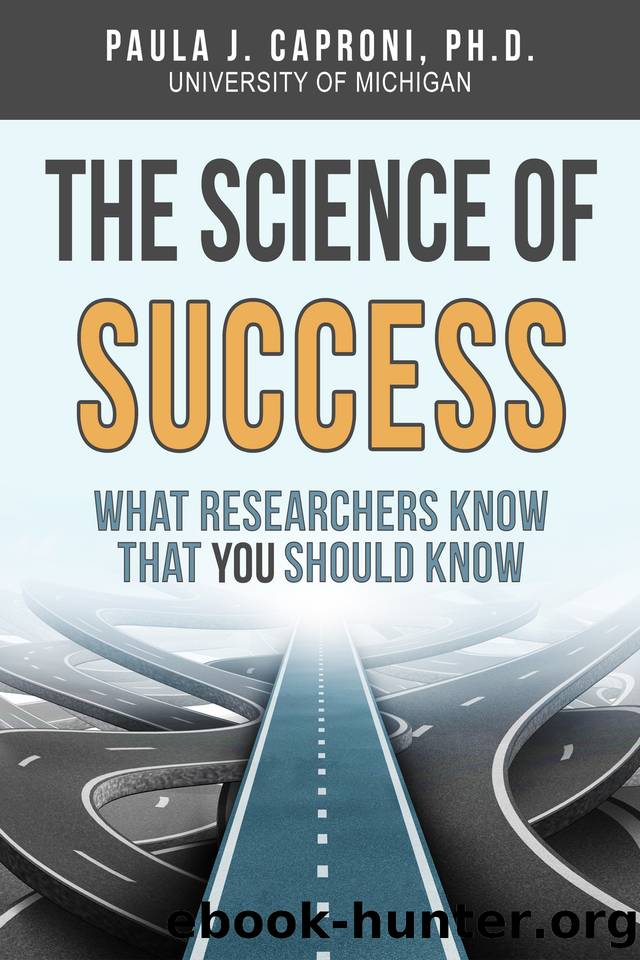The Science of Success: What Researchers Know that You Should Know by Caproni Paula J

Author:Caproni, Paula J. [Caproni, Paula J.]
Language: eng
Format: epub
Publisher: Van Rye Publishing, LLC
Published: 2016-12-07T16:00:00+00:00
Chapter 5
The Power of Relationships
“I've learned that people will forget what you said, people will forget what you did, but people will never forget how you made them feel.” —Maya Angelou, author, poet, and civil rights activist
I teach an MBA course about creating high-performing teams. One of the students’ course assignments is to ask 12 people who know them well to spend 20 minutes completing an online questionnaire about the student’s styles, strengths, and weaknesses. Usually, a few students tell me that they don’t know 12 people who can give them thoughtful feedback. I gently tell them that the fact that they can’t identify 12 people they can count on to spend 20 minutes to complete an online questionnaire on their behalves is perhaps the most useful takeaway they’ll get from the course. Heeding this cautionary advice, these students usually become more proactive in building relationships.
One of the most robust findings among researchers is that the ability to cultivate mutually supportive relationships is central to professional success and personal well-being.[ 1 ] No matter how conscientious and gritty you are, and no matter how deep your expertise, no one succeeds alone . The mutual good-will, trust, cooperation, and influence you develop through your relationships helps you get the resources you need to add value to your organizations, achieve your career goals, contribute to your communities, and take care of yourself and the people you love.
Social Capital
Researchers refer to the resources you get through your personal and professional relationships as social capital .[ 2 ] These resources include ideas, information, contacts, opportunities (such as job leads), mentoring, reputation, money, encouragement, and support. Without social capital, your ideas, projects, and goals can quickly get derailed.
Social capital can only exist within a relationship or network of relationships. It’s through your relationships that you obtain tacit knowledge that would otherwise be difficult to learn on your own—how to get along with a cranky boss or neighbor, what not to say during an important meeting, which courses to take, which clubs to join and conferences to attend, where to meet people who share your interests, where to find the best physician in town for your specific needs, and who you should talk to at your child’s school to find out about the challenges of the upcoming school year. In short, social capital refers to resources that add value and are embedded within relationships.
In this chapter, you’ll learn how social capital helps societies, organizations, and individuals achieve important goals. You’ll also learn four foundations essential to building your personal social capital: developing self-awareness, creating your brand, energizing others, and building your network of mutually supportive relationships. Throughout the chapter you’ll learn specific strategies for building mutually supportive relationships and creating social capital that benefits not only you, but also your family, organizations, and communities .
Social Capital and Societal Development
Researchers have found that strong social capital is essential for alleviating poverty, improving civil rights, fueling entrepreneurship, stimulating economic growth, creating safe communities, and enhancing the well-being of communities and families.
Download
This site does not store any files on its server. We only index and link to content provided by other sites. Please contact the content providers to delete copyright contents if any and email us, we'll remove relevant links or contents immediately.
Bullshit Jobs by David Graeber(4164)
Radical Candor by Kim Scott(2705)
I Am Right, You Are Wrong by Edward De Bono(2433)
23:27 by H. L. Roberts(2238)
Nomadland by Jessica Bruder(2050)
Average Is Over by Tyler Cowen(1830)
The Conflict Resolution Phrase Book by Barbara Mitchell & Cornelia Gamlem(1759)
Out of Our Minds: Learning to Be Creative by Ken Robinson(1725)
High-Impact Interview Questions by Victoria A. Hoevemeyer(1677)
An Everyone Culture: Becoming a Deliberately Developmental Organization by Robert Kegan & Lisa Laskow Lahey(1627)
Who Moved My Cheese?: An Amazing Way to Deal With Change in Your Work and in Your Life by Johnson Spencer(1627)
The Ideal Team Player by Patrick M. Lencioni(1627)
The Asshole Survival Guide by Robert I. Sutton(1588)
Automatic Society by Bernard Stiegler(1543)
Unleashed by Anne Morriss & Frances Frei(1524)
Who by Street Randy & Smart Geoff(1492)
42 Rules of Employee Engagement by Susan Stamm(1457)
96 Great Interview Questions to Ask Before You Hire by Paul Falcone(1441)
Fish! by Stephen C. Lundin(1392)
